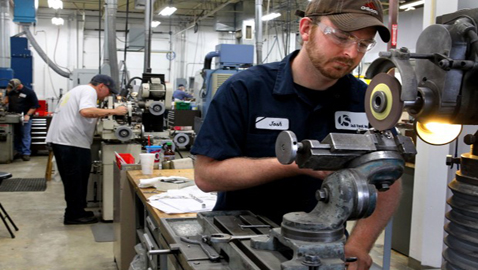Manufacturing Jobs To Provide Panacea For Country’s Unemployment Woes: But Do We Have The Skilled Personnel?
Post Views 0
But the fact remains that the manufacturing jobs have returned to home shores and the irony is that most of them are going unfilled because we don’t have the skilled labor to fill them.
A study by Boston Consulting Group says that U.S. manufacturers have job openings for 80,000 to 100,000 highly skilled employees. Workers in highest demand are welders, machinists and mechanics.
What President Obama and Gov. Romney need to understand that the threat to American manufacturing jobs is less from jobs going overseas, but from lack of skilled labor, which is going to be further compounded with the millions of jobs that are going to be vacated by retiring baby boomers.
Responding to a recent survey of the Manufacturing Institute, 82 percent of the respondents that they would like to hire more people, but there was a shortage of candidates for skilled production jobs. 80 percent said that they feared that this shortage was unlikely to be overcome in the near future.
Stan Shoun, president of Ranken Technical College said, “If I was a company, I’d be scared to death about the future, especially if I depended on labor and technology.”
Owners of manufacturing units say that they do not even realize there is a recession and find it ridiculous that there are millions of people who cannot find employment, simply because they have vacancies to fill and there are no suitable candidates.
The problem is that there is a stigma attached to manufacturing that has seen the younger generation in learning the trade. Baby boomers were discouraged from taking up careers that involved working in a factory by their elders who preferred that they earned graduate degrees that go them white collar jobs.
John Haake, the president of Titanova, a St. Charles laser manufacturer said, “Most kids are not being pulled into the skills trades. There’s a huge disconnect with the education system.”
Another Manufacturing survey saw an overwhelming majority, 86 percent, of Americans saying that they believed that manufacturing was “very important to their standard of living,” and an almost equal number felt that it should be made a national priority.
The respondents put manufacturing as the top-business that would generate maximum employment, yet two-thirds of them were disinclined to the suggestion of their children pursuing jobs in manufacturing.
Rod Nunn, vice chancellor for workforce and community development at St. Louis Community College said that, “Americans in general think we need to place a greater emphasis on manufacturing careers. It’s a priority. But when they look it as a career for their kids, it’s a different thing.”
Experts say that the manufacturing jobs will continue to remain unfilled unless parents, schools, industry and the government step up their efforts, push the accelerator a little harder and telling the kids, that going to graduate college is not the only path to a rewarding career.
The main reason why parents want their kids to steer away from manufacturing jobs is that they still feel it is a job in which the kids will soil their hands and clothes and fiddle around with wrenches. There’s a perception that manufacturing is dangerous and dirty. The truth is that manufacturing has changed considerably, with technology and computers and modern equipment making it a high-tech process.
“When you say ‘occupational vocation,’ the technology of the 60s, 70s and 80s comes to mind,” said Shoun, the Technical College president “The reality is that it’s all high technology now. We need to do a better job of showing not only kids but their parents as well what it means to be a machinist or an automotive technician – that it’s just as complex as being an engineer.”
Manufacturing Jobs To Provide Panacea For Country’s Unemployment Woes: But Do We Have The Skilled Personnel? by Harrison Barnes

